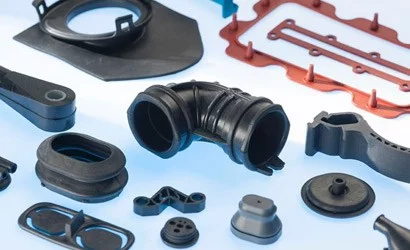When choosing a material to use for gaskets, many people opt for standard materials such as neoprene or silicone since they are readily available. While these materials may perform as desired for some applications, EPDM offers many favorable features and advantages when compared to other materials, making it an ideal gasket material.
EPDM Gasket
EPDM, or ethylene-propylene-diene monomer is a type of synthetic rubber that is used in many applications.
EPDM Gasket Material Properties
Ethylene and propylene are both hydrocarbons that remain in gaseous states at room temperature. When combined, they create polymers such as polyethylene and polypropylene, which remain solid. By controlling the polymerization process and adding the proper proportion of ethylene and propylene, it is possible to create EPDM.
The process of manufacturing EPDM creates long molecular chains that give the material its enhanced elastic properties. EPDM is unique among elastomers because it remains flexible at very low temperatures and can be formulated to withstand extremely high temperatures. The material is also resistant to oxidation and the aging effects of ultraviolet light.

EPDM possesses superior mechanical properties. It has a tensile strength ranging from 7 to 21 MPa, making it stronger than silicone, which has a tensile strength of 5 and 10 APa; nitrile, which is between 12 and 15 MPa; and neoprene, which is between 5 and 8 MPa.
EPDM rubber gaskets are more resistant to wear from abrasion and are formulated to resist harsh chemicals such as acids and alkalis. EPDM gasket material is ideal for applications involving hydrocarbon oils and petroleum products, which typically produce swelling in many other gasket materials. It’s stability and heat-resistant properties also make it suitable for applications using steam.
Material Benefits
EPDM rubber gaskets offer a variety of benefits when compared to other rubber gasket materials. They can withstand harsh environmental conditions and are designed to provide reliable, long-lasting sealing capabilities over a wide range of temperatures from -60° F to 300° F.
EPDM gaskets offer good electrical insulation and are highly resistant to wear, ultraviolet light, aging, wind, weather, and ozone. They are also color-stable and won’t stain mating surfaces.
EPDM Grades
EPDM gaskets are manufactured from solid, sponge, or foam rubber materials. Each type of material has a unique molecular structure enabling EPDM gaskets to possess physical properties, such as hardness and chemical resistance, to meet the specifications of many applications. EPDM gaskets are categorized by grades such as commercial, peroxide-cured, UL 94 flame-retardant, and FDA-approved.
EPDM Gasket Applications
EPDM is a strong, durable, and cost-effective option that offers superior performance for use in many applications, including:
- Outdoor. Since EPDM gaskets are able to withstand extreme temperature fluctuations, water, and UV rays, they are ideal for use in outdoor applications.
- Electrical. The material’s high electrical resistance makes EPDM gaskets suitable for many electrical installations.
- Open Joints. EPDM gaskets have a good compression set resistance, which allows for easy recovery, making it appropriate for applications where a joint may open up occasionally.
Contact Us About Your EPDM Gasket & Seal Needs
At ANGOF, we specialize in manufacturing precision die-cut and molded EPDM rubber gaskets and seals for various industries and applications. Our commitment to outstanding quality and customer service has earned us a reputation throughout the world as an industry leader. To request a quote or learn more about EPDM gaskets, contact us today to email info@angoindustry.com